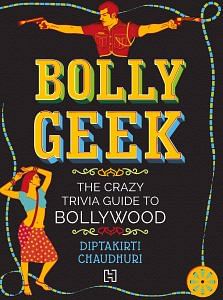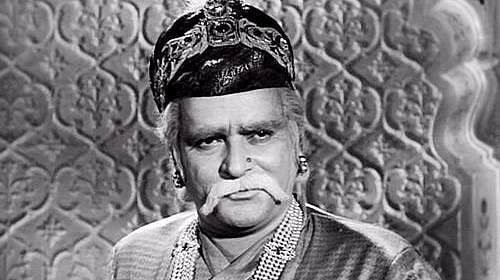The Mughals were great. The Mughals were not. The Mughals were great. The Mughals were not. As political battles go historical, as roads named after Aurangzeb are renamed and as battles with Akbar are lost or won 400 years after they were fought, the Mughals are all around us even today – not least because of the cuisine named after them! Mughal emperors – with their pomp and grandeur – have been a big favourite of Bollywood.
The first name in the list enters somewhat slyly. Because the film never got made!
Aakhri Mughal was supposed to be Abhishek Bachchan’s launch vehicle. Directed by J.P. Dutta, it was the tale of Bahadur Shah Zafar’s relationship with his son. Apparently, the rights were with Kamal Amrohi once upon a time, and he had wanted to make the film with Amitabh Bachchan after seeing him in Zanjeer. It did not happen then. It did not happen with the son either.1
1. With star sons getting launched in all-singing, all-dancing, all-muscle-flexing roles, a debut like this would have been very different (to the point of being risky). But then, so was Abhishek’s actual debut film—Refugee – with the same director.
That Kamal Amrohi was indeed serious about the film is borne out of the fact that he announced the film in 1974 with Dharmendra, and took out ads in trade and general interest magazines, seeking a newcomer – a ‘bepanah khubsoorat ladki’ – to play the lead.
The Film That Got Made Alert: Lal Quila, directed by Nanabhai Bhatt, is the story of Bahadur Shah Zafar (among others) who presides over the titular fort that becomes the nerve centre of the 1857 Sepoy Mutiny.
Also read: Madhubala and K Asif’s grandeur is what makes Mughal-e-Azam an epic
Shah Jahan’s daughter Jahan Ara (played by Mala Sinha) got her own film – a love story that ends in sacrifice because she promised to take care of her father (who was heartbroken after his beloved wife’s death). In Jahan Ara, Bharat Bhushan played her love interest, who defies a royal edict to meet and fall in love with a princess, only to give her up for the greater good of the dynasty. Thus, Jahan Ara’s father’s royal obsession gets immortalized both in marble and on celluloid.
A monument as timeless as the Taj Mahal has been accorded not one, but two movies named after it. Quite unfortunately, neither of the Shah Jahans evoked much excitement.
In the 1963 Taj Mahal, Pradeep Kumar played Prince Khurram Shah Jahan and Rehman played his father, Jahangir. The love story starts in Agra’s Meena Bazar, then proceeds to carrier pigeons bearing love notes, meanders around palace politics and parental angst, before finally settling down on the beautiful banks of the Yamuna, where the consort extracts a promise from the young prince that she be buried here in a mausoleum that immortalizes their love. The excellent soundtrack – composed by Roshan and written by Sahir Ludhianvi2 – includes the superhit ‘Jo vaada kiya woh nibhana padega’, which still pops up during retro shows on radio with
unfailing regularity.
Emperor Trivia: Pradeep Kumar has the distinction of playing Shah Jahan in this movie and Jahangir in another movie called Anarkali.
Akbar Khan made Taj Mahal: An Eternal Love Story with a lavish budget, but not much commercial success. Zulfi Sayed played the young Khurram, while Kabir Bedi donned luxuriant white tresses to play the old emperor Shah Jahan. Pakistani actress Sonya Jehan played the object of affection and devotion. The deadpan3 Arbaaz Khan played the next-in-line emperor, Aurangzeb, who considers all this tomb-building a bad waste of good marble, and places his father under house arrest.
Aurangzeb Alert: On the surface, Atul Sabharwal’s film Aurangzeb is about police and criminal families clashing in present-day Gurgaon, but inside every character lurks an Aurangzeb, someone who would put ‘kingship above kinship’ and wouldn’t hesitate to kill a relative or two to gain power. #deep
Also read: From Akbar’s court to Baghdad, Muslims laid foundation for scientific education and curiosity
Jahangir was immortalized by his birth name – Prince Salim – when one of India’s greatest actors played him in Mughal-e-Azam. K. Asif directed Dilip Kumar in the magnificent saga of a prince rebelling against his father, the emperor, for the love of a woman. Before he becomes the ‘conqueror of the world’, Salim is just a man in love, and frustrated by his class-conscious father. In some of the largest battle scenes filmed in Bollywood, Prince Salim takes on Emperor Akbar and loses spectacularly. Prithviraj Kapoor played the baritone-voiced emperor, whose kingship forces him to take up arms against his rebellious son.
And then there is Madhubala, worth every war fought in the history of India.
Emperor Trivia: In Anand, Johnny Walker also played Prince Salim in a theatre production and utters the immortal lines that Anand would repeat in his last speech: ‘Zindagi aur maut uparwale ke haath mein hai, jahanpanah…’
More Emperor Trivia: In Shashilal Nair’s film Angaar, Kader Khan played a Robin Hood-esque mafia don – Jahangir Khan – who rules Bombay with an iron hand and velvet gloves. His (and his sons’) run- ins with hero Jackie Shroff form the crux of this film.
In Jodha Akbar – a story situated historically before but chronologically released after Mughal-e-Azam – Akbar is no longer the spoilsport but a rather flamboyant lover. Hrithik Roshan – he of the sculpted body and chiselled looks – romances Aishwarya Rai – she of the dulcet voice and mesmerizing eyes – in this grand film.
Ashutosh Gowariker invented several new historical events to concoct this tale of love and honour between the Muslim ruler of India and his Hindu wife. When Akbar acquiesces to each of Jodha’s demands in order to marry her, who knew he would soon be haranguing his own son for marrying a girl of his choice?
Navaratna Alert: Akbar’s court had nine jewels, for which he had no plans of disinvestment. In fact, the escapades of the Navaratnas have spawned several issues of Amar Chitra Katha and quite a few films.
Tansen (1943) and Sangeet Samrat Tansen (1962) were both films about the singer who could (literally) light up a room with his voice. They focus more on his love stories that inspire him to sing. In the earlier film, singer–actor K.L. Saigal played the title role. In the 1962 film, Bharat Bhushan played Tansen a decade after he played the title role of Baiju Bawra, Tansen’s biggest musical rival. Legend has it that Baiju Bawra defeated Tansen in a musical duel, and this was the crux of the film. Both the film and its soundtrack went on to become monster hits!
Bharat Bhushan has played Tansen, Baiju Bawra and Mirza Ghalib in three different films (not to mention, Mirza Yusuf – i.e., Jahan Ara’s lover in yet another). Surely, he deserves some kind of a prize for being so loyal to the Mughals!
Humayun – made in 1945 – was one of the biggest star casts to be assembled for a Mughal film. Ashok Kumar played Humayun, who is smitten with Hamida Banu played by Nargis, and they were supported by most of the major character actors of the time. Along with this love story come subplots of Rajput honour (involving an adopted sister in a conquered state), palace intrigue (by people who don’t like good ol’ Humayun), a succession battle (when Babur dies) and a rampaging enemy (in the form of Sher Khan4). You know Mughal history, so it wouldn’t be a spoiler to reveal that the film ends with the birth of Jalaluddin Mohammad Akbar. Considering Humayun’s life ended while stepping down (morbid pun intended), Akbar was clearly stepping up – having inspired several of the films in this chapter!
The final name in the list is Babar or – more accurately – Baabarr, a crime drama set in the ganglands of Uttar Pradesh, where one Baabarr Qureshi rules the underworld with aggressive help from the police and politicians. It traces his rise from a poor little boy to a dreaded gangster, and pits him against two charismatic actors as police officers – Om Puri and Mithun Chakraborty. The movie’s tagline ominously declares, ‘I was… I am… I will be… Baabarr’, but it did nothing to improve the collections and Baabarr collapsed at the box office.
Historical Alert: The last time Om Puri and Mithun Chakraborty formed a team was when the former was the latter’s manager in Disco Dancer, and you could say Mithun was the Emperor of Disco!
This excerpt from Bollygeek: The Crazy Trivia Guide to Bollywood has been published with special permission from Hachette India.





Mughlas were worst people .Like Nazis
Mughals broke our Temples. They are most inhuman people .They holocaust Hindus like Nazis.Then also this media and Bollywood always glorified Mughals.
Bollywood is a shit… No words left for them actually…
My counsel – Watch some Iranian Cinema, if you wish to aporeciate all aspects of talent based thesoian arts, and make a vow never to patronized anything related with a film industry that has worked only to undermine the very ethos if the land which afforded it, unanticipated luxuries and unexampled fame – an eminence it never deserved
The British crown took India from last Mughal Bahadur shah zafer . It handed over reign of power to decedent of Mughal while leaving India. So in most of the films made about Mughals during the regime of that dynasty , Mughals were bound to be projected in a light that showed them great emperors out to take pity on their subjects, who were mainly the Hindus, They were to be projected as most secular specie that ever inhabited this planet. They were suppose to be projected as epitome of love and affection. Their Wars, battles , greed were not to be shown in any bad light. There was no need to present them as invaders who wanted to make India as Gazeva-e-hind. As a nascent industry — film industry in India just bowed diligently. Their greatness will remain imposed as long as leftists command and control the media in India .
Print also loves Mughals.
The reality of Mughals is they were Nazis for the Indians.
But shown as sadhus.
After Moguls, the British invaded. They were civilized compared to Moguls, developed infrastructure, did not demolish temples but protected them as as heritage, did not kill people of other faiths etc. Yet we decided and fought to throw them out as they were foreigners ruling over us. If we do not consider British as great, why sould we consider Moguls as great?
Bollywood pls read the history of Moghuls indepth. A selected few of them committed the most inhumane acts . It’s pity we are fed with wrong pages in history.
Naturally. It is full of them
So before mughals Hindus lived in jungles and ate leaves and roots
Please add this line
Your secular history will be complete
Self inflicted injury. The topic of discussion is entirely different from any religiosity. But one Hindu with massive inferiority complex poke his nose where it shouldn’t be.
It shows muslim domination and Hindi people had no choice. Defeated people love their tormentors and weave a dream as if the tormentors were their ma baap.Even in hindi belt jai santoshi ma, sant jnaneswar shantarams movies were popular. Mythologicals were more popular in south.
You can twist the hand’s of the history.
Learn to digest the reality of Mughal empire,.